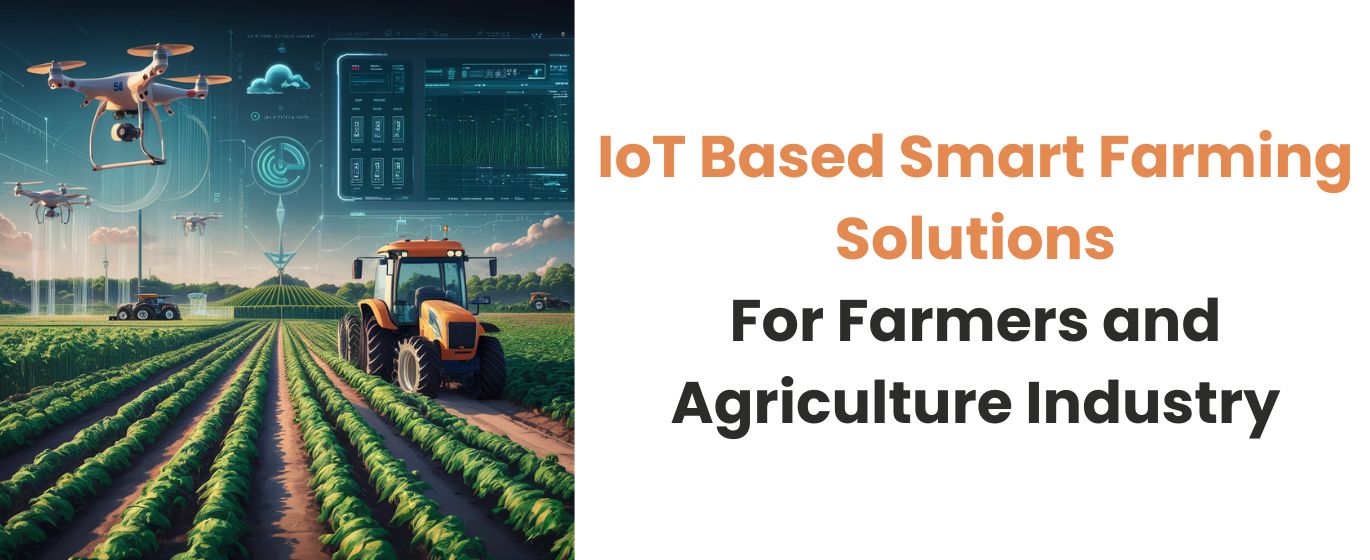IoT Based Smart Farming Solution For Farmers and Agriculture Industry
In today's rapidly evolving agricultural landscape, IoT-based smart farming solutions have emerged as a game-changer for farmers and the agriculture industry. These innovative technologies offer a cutting-edge approach to enhance productivity, efficiency, and sustainability in farming practices. Let's delve deeper into the world of IoT-based smart farming and explore the benefits it brings to farmers and the agriculture sector. IoT enables farmers to monitor their fields and livestock with unprecedented precision. By deploying sensors that gather real-time data on soil moisture, temperature, and humidity, farmers can optimize their irrigation schedules, leading to healthier crops and higher yields. Moreover, the automation of routine tasks frees up valuable time for farmers to focus on strategic decision-making and innovation. Gone are the days of guesswork and intuition; IoT empowers farmers with actionable insights derived from continuous monitoring and analysis. With the aid of connected devices and cloud-based platforms, farmers can remotely track environmental conditions, pest infestations, and crop growth patterns. This wealth of data allows for proactive interventions, minimizing risks and maximizing returns. In an industry where resources are finite and margins are tight, efficiency is paramount. IoT facilitates the judicious use of resources by precisely matching inputs to the needs of the crop. Whether it's water, fertilizer, or pesticides, IoT-driven systems ensure that resources are deployed optimally, reducing waste and lowering operational costs. IoT in farming enhances efficiency through real-time monitoring, optimizes resource usage, and enables data-driven decision-making for higher yields and sustainability. Central to any IoT-based farming solution are sensors that capture key agronomic parameters. These sensors, embedded in the soil, continuously measure moisture levels, temperature variations, and nutrient concentrations. By providing real-time data, they enable farmers to make informed decisions regarding irrigation, fertilization, and crop health. IoT-enabled irrigation systems represent a quantum leap in water management practices. By leveraging data from soil sensors, weather forecasts, and crop models, these systems deliver water precisely where and when it's needed. Through drip irrigation, precision spraying, and variable rate application, they minimize water wastage and ensure optimal moisture levels for plant growth. The sky is no longer the limit for farm monitoring, thanks to the proliferation of agricultural drones. Equipped with cameras, multispectral sensors, and GPS technology, drones offer a bird's-eye view of the farm, capturing high-resolution imagery and actionable data. From assessing crop health to mapping field boundaries, drones provide farmers with invaluable insights for better decision-making.What are the Benefits of IoT in Farming?
1. Increased Efficiency and Productivity:
2. Real-time Monitoring and Data Analysis:
3. Resource Optimization and Cost Reduction:
Components of IoT Smart Farming Solution
1) Sensors for Monitoring Soil Conditions:
2) Automated Irrigation Systems:
3) Drones for Aerial Monitoring:
Share your project details to build your path toward success.
4) Data Analytics and Decision-making Tools:
At the heart of the IoT ecosystem lies data-the currency of the digital age. By harnessing the power of big data analytics and machine learning algorithms, farmers can unlock hidden patterns and trends in their operations. Whether it's predicting crop yields, optimizing planting schedules, or identifying pest outbreaks, data-driven decision-making has become the cornerstone of modern agriculture.
Implementation and Integration
While the promise of IoT in agriculture is undeniable, its adoption presents challenges of its own. From initial investment costs to technological complexity, farmers must weigh the benefits against the barriers. Moreover, the seamless integration of IoT solutions into existing farming practices requires careful planning and stakeholder engagement. Nonetheless, with the right support and guidance, the transition to smart farming holds immense potential for sustainable growth and prosperity.
Quantifiable Results and Improvements Seen Post-implementation
Across diverse agricultural landscapes, the story remains the same: IoT delivers tangible results. Whether it's slashing input costs, boosting yields, or conserving natural resources, the impact of IoT on farm productivity is undeniable. Moreover, as the technology continues to evolve, so too will its benefits, ushering in a new era of prosperity for farmers around the globe.
Conclusion
In the age-old dance between man and nature, technology has emerged as a silent partner, guiding each step towards a brighter future. With IoT as our beacon, we stand on the threshold of a new agricultural revolution-one defined by efficiency, sustainability, and abundance. As we embrace this digital frontier, let us not forget the timeless wisdom of the land, for it is there that our journey truly begins.
Take the first step towards a more efficient and productive farm. Contact us at sales@iihglobal.com to discover how our IoT-based smart farming solutions can benefit your agriculture business.







